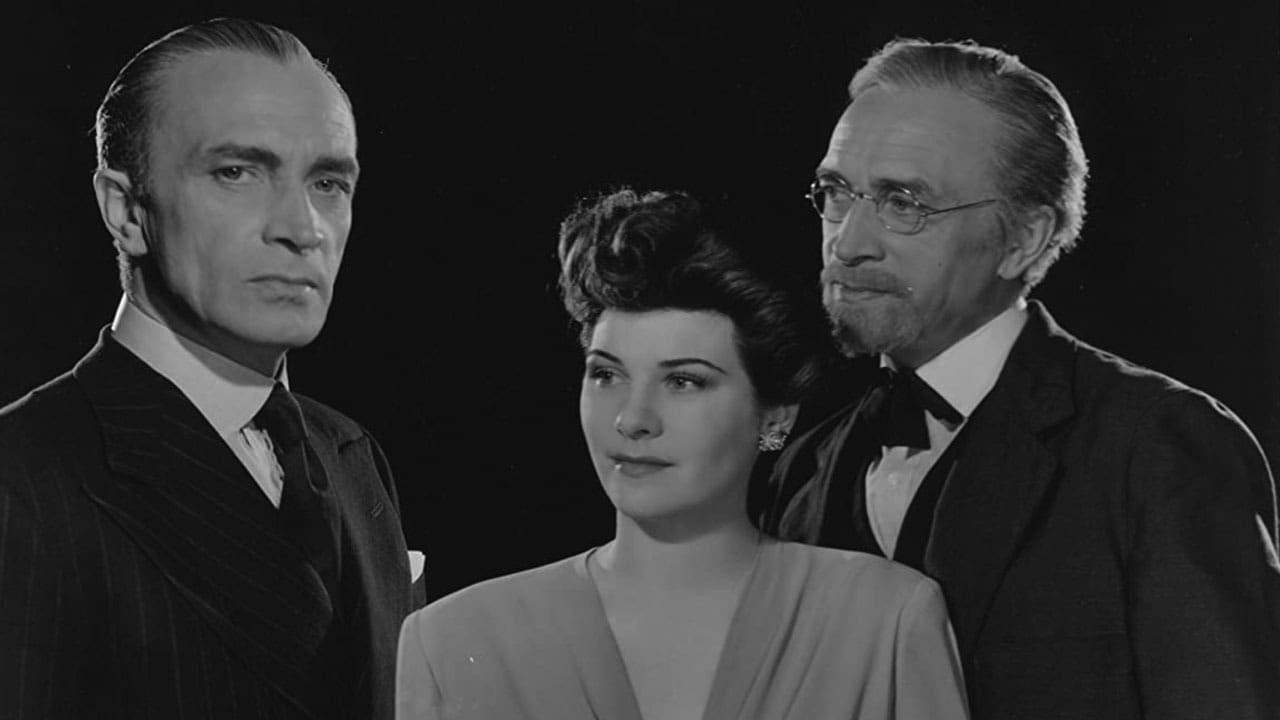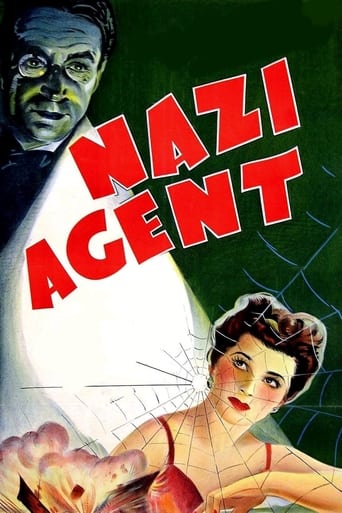



It was OK. I don't see why everyone loves it so much. It wasn't very smart or deep or well-directed.
View MoreIt's the kind of movie you'll want to see a second time with someone who hasn't seen it yet, to remember what it was like to watch it for the first time.
View MoreThe movie really just wants to entertain people.
Through painfully honest and emotional moments, the movie becomes irresistibly relatable
View MoreSummary: Patriotic But not Soapy *** This review may contain spoilers ***This is the story of twins who may have looked identical and grown up in the same household in pre-WWII Germany, but who are worlds apart, well, in just about everything. One immigrated to America while the other remained in Germany to serve the Nazis. While Otto was kind and caring, loving his adopted country, Hugo was more than eager to carry out Nazi plans to sabotage American interests. It must have been amazingly difficult to produce a movie which shows true patriotism without making the moviegoer roll his eyes. Somehow, most of us seem to have been programmed against such films. But this film was patriotic without being soapy. SPOILER ALERT: The last scene tore at my heart. Okay, the music in the scene was a little too much, but if you'll mute your TV and watch the look on Veidt's face when on the way to his death he sees the Statue of Liberty, well, it made me remember that America really is worth fighting for. I needed to see that movie. Perhaps you need to as well. And how ironic. Conrad Veidt had few opportunities to play anything other than an evil Nazi (this film being one of them). And yet all the while, most of his paychecks were spent to support the allies against the forces of his own native land, Germany! As I read a little about Veidt after watching the movie, I wondered if perhaps this film was the only real opportunity the man ever had as an actor to display his incredibly strong love of freedom.
View MoreRemember the 1964 Bette Davis thriller-Dead Ringer? In that one, Bette killed her identical twin sister who was quite bad and assumed her identity and by the end went on trial for killing the evil sister's husband as everyone thought she was the lady. I see almost the same premise in this 1942 film with the exception that the horrible Nazis are involved.Conrad Veidt did not look well in this film and in fact, the following year, he succumbed to a coronary at age 50. In this film, he shoots his Nazi brother and assumes his identity in order to destroy the spy ring. Ironically, in the end, he is returned to Germany for whom he is really is. The reason why this occurs shall remain a secret to you until you view this film.The story is definitely one that is intriguing. It will hold your interest in the never ending saga of good triumphing over evil. The end was just too ironic. We had a real American hero here.
View MoreConrad Veidt's career in European (and American) film from 1919 - 1939 was one as a notable star. He had played Cesar the Sonabulist in THE CABINET OF DR. CALIGARI in 1919, and been a star ever since. In the silent film period it was easy for him to have an international audience as Gwynplaine in THE MAN WHO LAUGHS and as King Louis XI of France in BELOVED ROGUE (with John Barrymore). But he was anti - Nazi and Veidt left Germany in 1933 and settled in England, where he remained a star. His last film in England of greatness was as the evil vizier Jafar in THE THIEF OF BAGHDAD. Then he went to Hollywood.Most Americans recall him for his American films, although he did not make many in his last three years (1940 - 1943). These included a comic villain in WHISTLING IN THE DARK, a selfish Swedish scoundrel in A WOMAN'S FACE, and Nazis in CASABLANCA (his best recalled performance - as Major Strasser), ESCAPE, and ALL THROUGH THE NIGHT. Twice he portrayed anti-Nazi Germans: ABOVE SUSPICION (where he is aiding Joan Crawford and Fred MacMurray, and the villain is Basil Rathbone!), and this film - probably the most interesting of the movies he made in Hollywood. The plot is simple. Veidt plays twin brothers, one of whom has been living in the U.S. since World War I, having gotten sick of the militarism and racial crap at home. The younger brother remained behind as a dedicated careerist Nazi. The younger brother has been sent to the U.S. as a "diplomat" but in reality to head a sabotage ring. He uses some of his agents to locate the older brother, and blackmail him into acquiescing into working for the Vaterland again. The older brother is forced by circumstances (relatives in Germany may be executed or tortured if he refuses). But when he learns of the various sabotage acts planned, and when the ring members kill one of his closest friends, the older brother fights back. He confronts and kills the younger brother, and pretends he is the younger brother. Then he proceeds to destroy the sabotage ring.Veidt's Nazis were quite convincing, as he obviously based them on the people he met in Berlin in the 1920s and 1930s. Major Strasser, for example, is very businesslike - see how he confronts Rick with his file at the start of CASABLANCA and shows little concern when Rick starts reading it - and usually intelligent. He is also ready to turn into a subtly deadly threat, as when he tells Elsa about the cheapness of life in Casablanca. So the young careerist is quite true to form.But the older brother is fascinating. The issue of the "good German" was difficult to get across after 1941, as most Americans saw Hitler's Germany as a real, viable threat. It was rare, in the movies of those years, to think of making a film about Germans who were decent (it was actually easier to show Italians who were decent - see Forunio Bonanova's Italian general in FIVE GRAVES TO CAIRO). If a German was good or sympathetic, he or she might have been Jewish. But Veidt's two brothers are upper crust junkers. They are part of the establishment. The older brother was in the army (unlike the younger one), so he knew what was expected of the German nobility. But he got to dislike the arrogance of the class towards all others. So he fled his native land to escape what he hated.Veidt's not the only good German in the film. For every younger brother, and Martin Kosleck, and Deborah Tree, there is a Frank Reicher and Anna Ayars who supports the decency wiped away by the Nazi regime. Veidt's older brother fall for Ayars, and in one sweet moment one sees what the Nazis have destroyed. They are seated in a car alone, and have put on the radio. The moon is out, and it is a moment for love-making. But the radio plays a piece by Felix Mendelsohn (who was Jewish, and whose music was forbidden by the Nazi regime in Germany). Ayars, sadly, says "Verboten.", and starts turning it off. Veidt gently stops her and says, "Just this once." They cuddle listening to the music.Veidt also demonstrates a trait which (oddly enough) he can share with the Nazi Kosleck. The older brother's hiding spot in America was discovered by Marc Lawrence, who has sold his services to the Nazis. But later (after the older brother has begun impersonating the dead younger one), Lawrence returns to squeeze more money out of his German employers. Kosleck tells this to Veidt (and it is obvious that Kosleck is disgusted by this greedy American). Veidt says he'll speak to Lawrence. He does open the safe and give Lawrence the money without a word. Then after Lawrence puts the money in his pocket, Veidt grabs him around the neck and with a fierce look in his eye tells him never to ask for another extra cent beyond his salary again if he knows what is good for him. Lawrence is thoroughly frightened of his "employer" after that - and the viewer actually sides with Veidt at that moment even if he had been the younger brother instead of the older one.NAZI AGENT was a programmer, but it shows what would have been Veidt's ability to play a hero in American films. If he had survived World War II he probably would have been a star along the lines of his French contemporary Charles Boyer, playing good characters as well as bad ones. He did not have the fortune to survive, but we know what he might have been like.
View MoreI saw this movie as a teen (they used to show it on T.V.) a lot and always loved it. Conrad Veidt plays twins - good versus evil. I taped it last year (2002)from Turner Classic Movies (after calling them and asking them to play it). It's still a wonderful movie. Conrad Veidt is a Nazi you love to hate. (Casablanca, Escape, A Woman's Face, All Through the Night) Playing twins, you see the angst in the good brother (Otto Becker) knowing his twin (Herr Baron) is a Nazi trying to destroy the U.S. - precisely why Otto left Germany. Herr Baron seeks out his brother in N.Y. to use his bookstore as part of his Nazi operation. Of course, Otto refuses to no avail and winds up a powerless pawn. He lives above the store under constant surveillance. One night, Herr Baron gets lonely and pays Otto a visit alone. An argument/struggle ensues, and Otto kills the Baron. Thinking fast, he decides the only way out is to impersonate his brother to save our country. He manages to fool everyone, except for the Baron's man-servant Fritz who came over with him. Otto's cover is blown when he emerges from the shower and Fritz spots a tell tale scar on his back. When Otto emerges in a bathrobe, Fritz has a glass of warm milk waiting for him, as in the old days. Otto's fears are unnecessary as Fritz' loyalty to him is undying.Otto succeeds in foiling all Herr Baron's plans but subsequently pays the price when he has to give himself up in order to save someone's life. Watch his face when he is being deported back to Germany and he passes the Statue of Liberty. The pain and tears he fights back are real.
View More